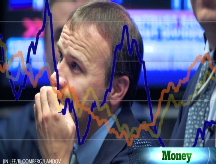Learning to love this bear market
Stock sell-offs are a reminder of just how risky investing can be. But that's a good thing.
 |
| Larry Swedroe is a principal and director of research for Buckingham Asset Management, a fee-only investment adviser in St. Louis. He is also the author of "Wise Investing Made Simple." |

| MMA | 0.69% |
| $10K MMA | 0.42% |
| 6 month CD | 0.94% |
| 1 yr CD | 1.49% |
| 5 yr CD | 1.93% |
(Money Magazine) -- With U.S. equities down 24% and foreign shares off 33% from their October peak, you probably think Wall Street is broken. It's not. In fact, dramatic downturns are actually a sign the market is working. Let me explain.
The way I see it, bear markets are like taxes. They're painful and inevitable, but ultimately they're a necessary evil. Just as we all have to pay taxes for a functioning government, investors must suffer occasional losses if they strive to build long-term wealth.
That's because bear markets are a reminder of one of the most important concepts in investing: the relationship between the risk you take and your expected returns.
You know, for instance, that in the long run owning stocks is highly likely to be more rewarding than putting your money into ultrasafe one-month Treasury bills. But you also know that equities don't outperform T-bills every year. Losses, in fact, are quite common.
In 23 of the 82 years from 1926 through 2007, the S&P 500 posted negative returns. And often these drops can be severe: Between March 2000 and October 2002, equities shed more than 49% of their value.
Alas, there are no guarantees on Wall Street. But that's the point: While you might wish that stocks never suffered any losses, without the risk of major setbacks, equities wouldn't provide you with those higher potential returns.
It has to do with a concept called risk premium. This term refers to the returns you can expect an investment to deliver beyond what an absolutely safe asset provides.
Think of it as combat pay - extra compensation for agreeing to put yourself in harm's way. The greater the risk, the greater the possible reward (see the chart to the right).
During bull markets, investors often lose sight of this relationship. We tend to assume that the good news that's driving up our stocks at a given moment will forever stay that way. But that's what bear markets are for - to remind us of the risk of being too exuberant.
Isn't it possible to enjoy this premium while avoiding losses? Don't even think about trying to time the market. Just as taxes redistribute money from the wealthy to those in need, the market has a knack for transferring wealth from those without disciplined investing plans to those with them.
Consider the results of a 2005 study by Morningstar. In all 17 fund categories Morningstar tracks, the returns actually earned by fund investors were lower than the stated returns of the funds they used.
Why? Market timing: Investors try to chase hot returns but get in at the wrong time. Or they foolishly think they can avoid losses.
As former Fidelity Magellan manager Peter Lynch once said, "Far more money has been lost by investors in preparing for corrections or anticipating corrections than has been lost in the corrections themselves."
Of course, this lack of discipline represents its own form of risk - the risk that you'll undo your long-term strategy. Unfortunately, that's one risk you won't receive a premium for taking on.
Do you (and your spouse) make more than $170,000 annually and worry about tax-efficient retirement planning? If so, send your name, age, occupation, income and questions, along with a recent photo, to makeover@moneymail.com. We will be providing advice to a family in this situation in an upcoming article - and it could be you! ![]()



